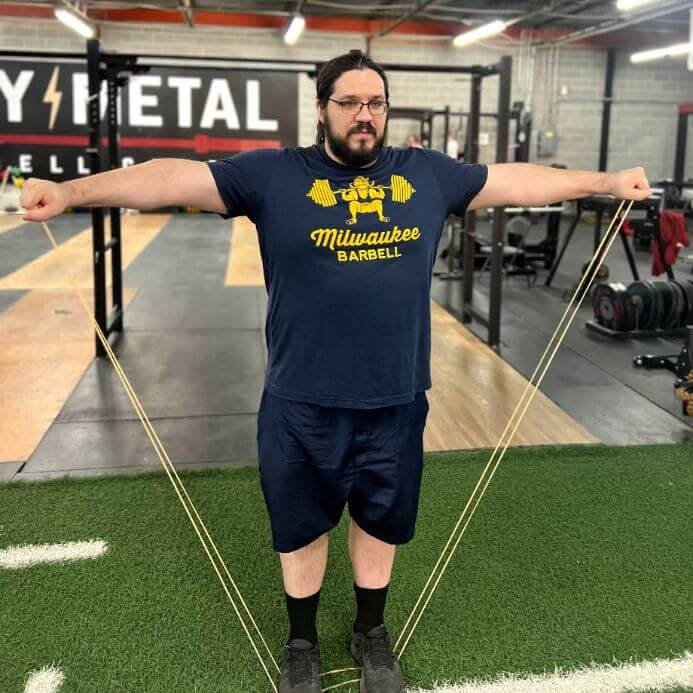We test and review fitness products based on an independent, multi-point methodology. If you use our links to purchase something, we may earn a commission. Read our disclosures.
The beauty of resistance bands is that they don’t rely on gravity for resistance like dumbbells and barbells, so you can do lots of exercises at various angles to challenge your muscles in all different directions. Plus, resistance bands are portable, and you can work out anywhere with them, including at home.
Performing resistance band exercises is a fantastic method to add variety to your routine and to give your joints a break from the constant pounding of gravity and the barbell. You have come to the right place when looking for an upper-body resistance band workout to do in the comfort of your home.
Here we will dive into why you should use resistance bands for your upper-body exercises, give you an upper-body resistance band workout, and explain the exercises you’ll be doing. Ready to get your flex on? Then let’s go.
Why Use Resistance Bands for an Upper-Body Workout?
With so many tools at your disposal, why should you use resistance bands for your upper-body workout? Here are a couple of reasons off the top of this certified personal trainer’s head.
Ease of Use
Resistance bands make it easier to switch between exercises. You don’t need to be an experienced exerciser to use them; most exercises are easily picked up. This makes it perfect for beginners starting home workouts.
RELATED: What is Resistance Training?
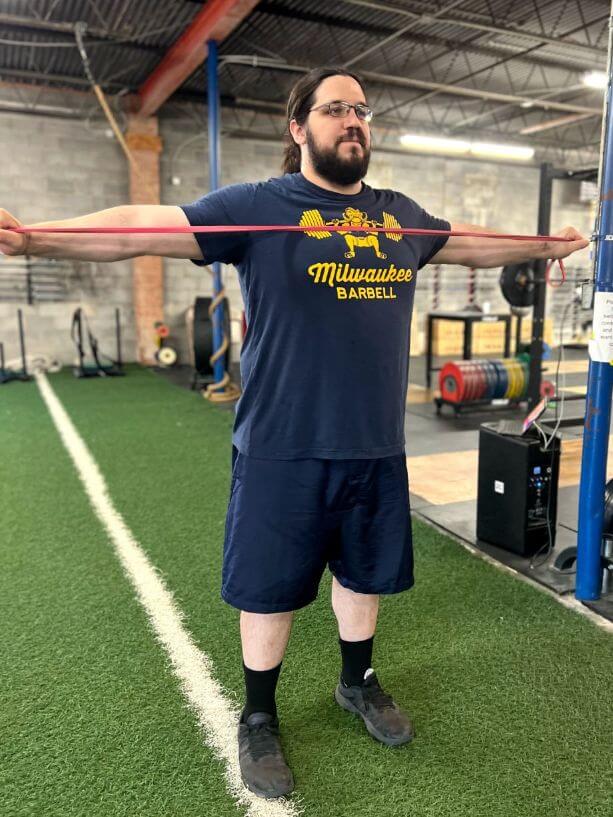
Better Muscle Recruitment
The biggest advantage of bands is that they don’t rely on gravity for resistance like machines and most free weights. With a band, you can perform various exercises from different angles to challenge your muscles differently. The resistance band is tight through most of the range of motion whether you’re training your glutes or biceps or hamstrings. In that way, bands train your muscles in ways a barbell or dumbbell can’t.
RELATED: Free Weights vs Resistance Bands
Joint Friendly
When you’re lifting with free weights (kettlebells, dumbbells, and barbells) and weight machines, they’re putting a certain amount of stress on your joints. This stress is not bad, but if your joints are angry, the band gives you a welcome break. When the band is not stretched, there is minimal stress on your joints, which can provide your body a reprieve from constant loading from the free weights.
Increased Volume
Due to the minimal joint stress and ease of use, you can bump up your reps and sets on your upper-body workout without cutting too much into your recovery from your free weight, body weight, and cardio workouts.
RELATED: A Complete Guide to Using Resistance Bands
Upper-Body Resistance Band Workout
Here’s a sample resistance band upper-body workout you can perform at home. The sets and reps are guidelines, and you can adjust them to suit your current workout goals.
You’ll perform supersets, alternating back and forth between exercises, but if you like circuits, perform the six exercises below one after the other with minimal rest in-between exercises.
RELATED: Full-Body Resistance Band Workout
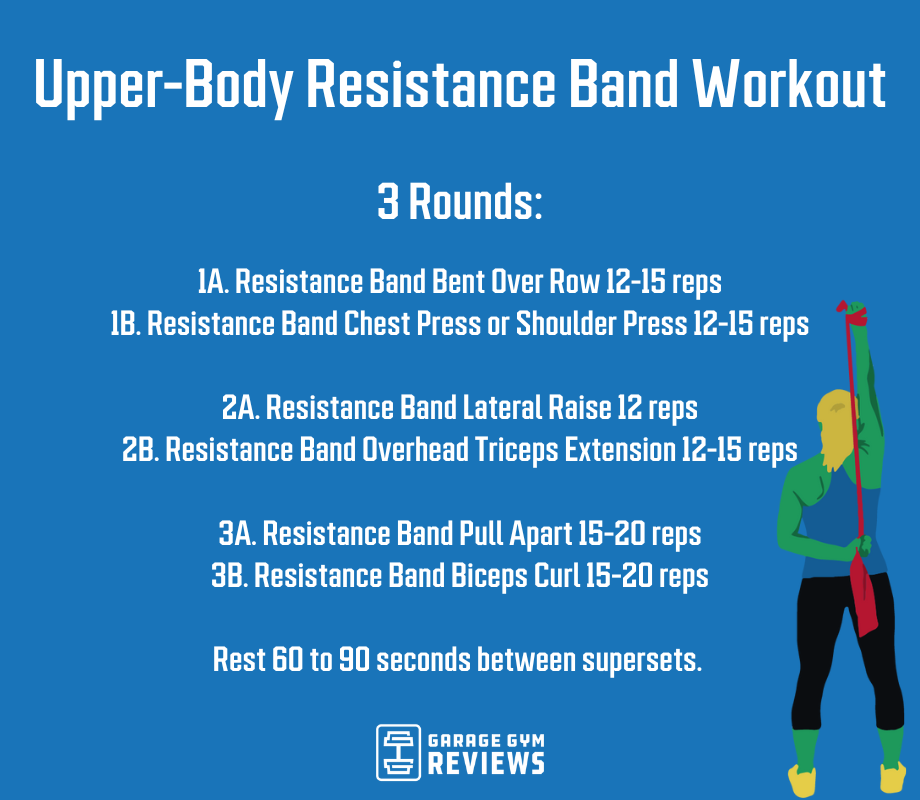
Note: Perform a light warmup before doing this training.
3 Rounds:
1A. Resistance Band Bent Over Row 12-15 reps
1B. Resistance Band Chest Press or Shoulder Press 12-15 reps
2A. Resistance Band Lateral Raise 12 reps
2B. Resistance Band Overhead Triceps Extension 12-15 reps
3A. Resistance Band Pull Apart 15-20 reps
3B. Resistance Band Biceps Curl 15-20 reps
Rest 60 to 90 seconds between supersets.
Expert Guide: How to Do Upper-Body Resistance Band Exercises
There are many resistance band upper-body exercises you could do, but below, we will cover the best and most basic resistance band exercises that train your entire upper body in the comfort of your home.
Resistance Band Biceps Curls
Muscles Targeted: Forearms, biceps, anterior deltoid
How to Do It:
- Grip the elastic band with an underhand grip and stand in the middle of the band under both feet.
- With your shoulders down and chest up, curl the handles until your hands are at shoulder level.
- Pause, lower down slowly, and repeat.
Trainer Tip: Vary your grip to work your forearms and biceps from different angles for better biceps development.
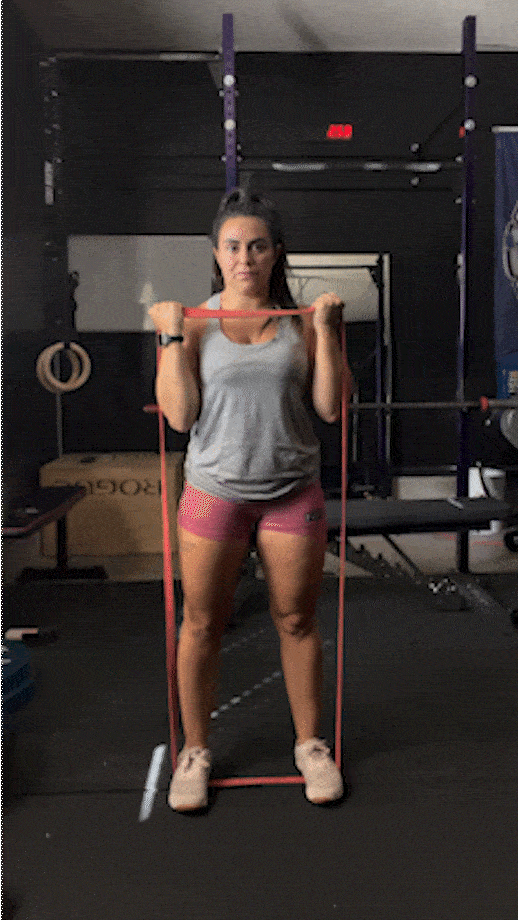
Resistance Band Overhead Tricep Extensions
Muscles Targeted: All three triceps muscles
How to Do It:
- Place the end of the band under the middle of your right foot and step forward with the left foot.
- Then bring the handles of the band up behind your ears.
- With good posture and keeping your elbows tucked in, extend the elbows until lockout.
- Slowly lower down and repeat for reps.
Trainer Tip: Performing this one arm at a time may improve strength imbalances between sides.
RELATED: How to Squat With Resistance Bands
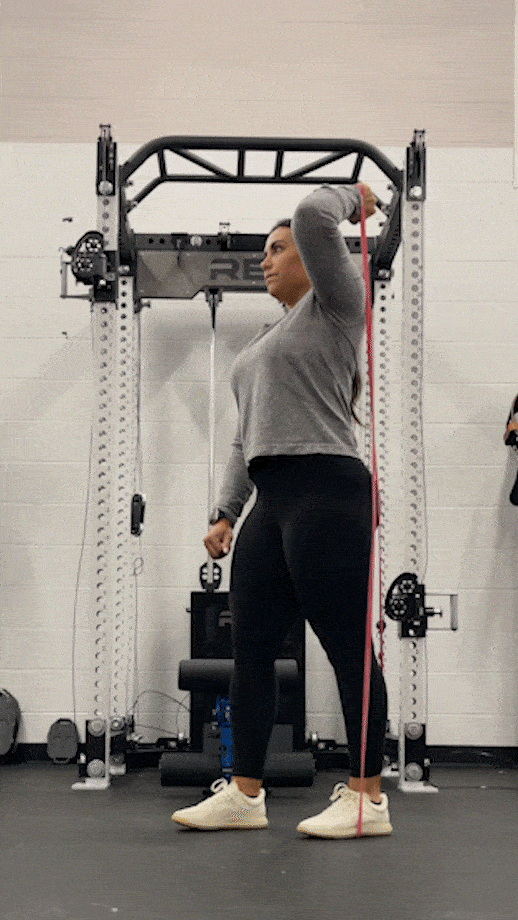
Resistance Band Bent-Over Row
Muscles Targeted: Lower back, upper back, posterior deltoid, biceps, and forearms
How to Do It:
- Place the band under the middle of both feet, with the feet hip-width apart.
- Grip both handles and hinge down with your shoulders down and chest up, feeling a stretch in your lower body and hamstrings.
- Row your hands to the front of your hips, feeling a muscle contraction in your upper back.
- Slowly lower down and repeat.
Trainer Tip: Performing with one hand at a time will add more core stability to the mix.
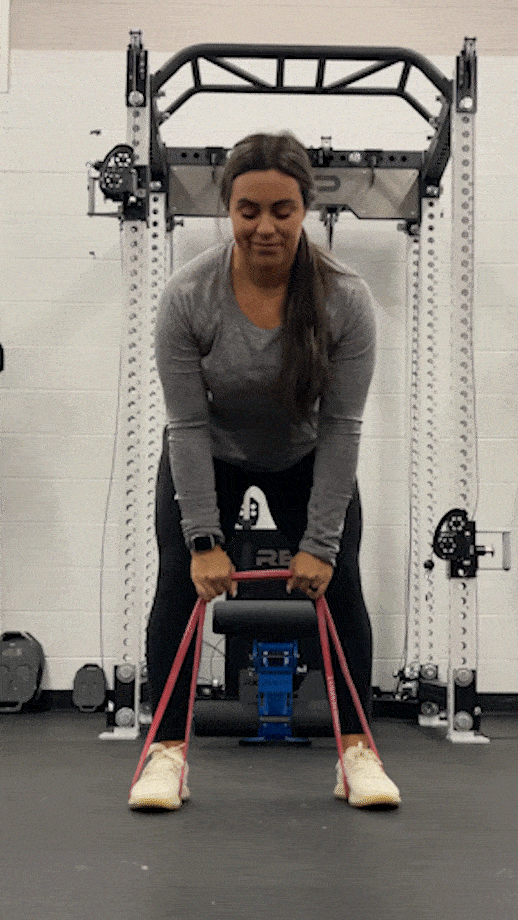
Resistance Band Chest Press
Muscles Targeted: Pectorals, anterior deltoid, triceps
How to Do It:
- Anchor the resistance band around a solid object below chest height.
- Face away from the anchor point with the band in both hands and step forward until you feel a stretch in the band.
- Press until elbows are extended, and bring your hands together.
- Return to the starting position and repeat for desired reps.
Trainer Tip: If you have nothing to anchor the band on, wrap the band around your upper back and hold the band below the handles.
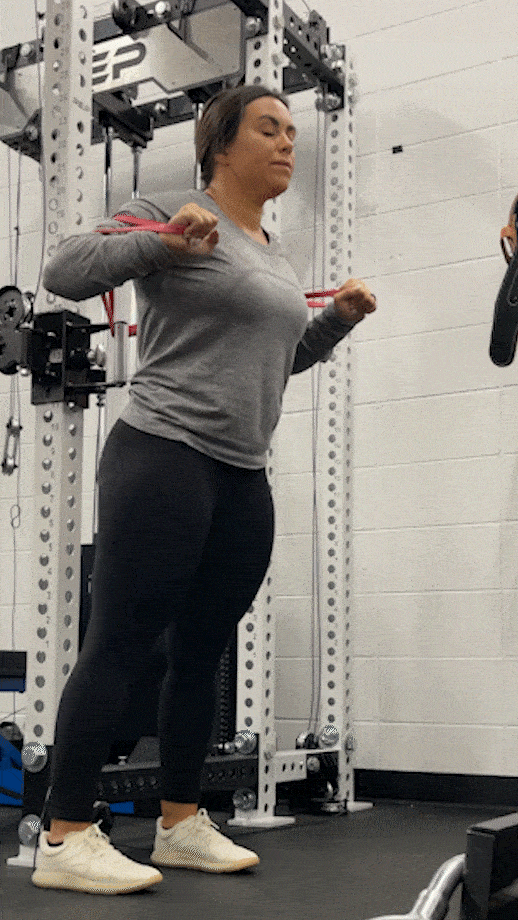
Resistance Band Shoulder Press
Muscles Targeted: Deltoids, pectorals, and triceps
How to Do It:
- Put the band under the middle of both feet and lift the handles to the front of your shoulders with an overhand grip.
- With your shoulders down and chest up, press overhead until your elbows are extended.
- Pause for a second and slowly lower down, and repeat
Trainer Tip: Ensure your biceps are by or behind your ears when your arms are overhead instead of finishing with the arms forward.
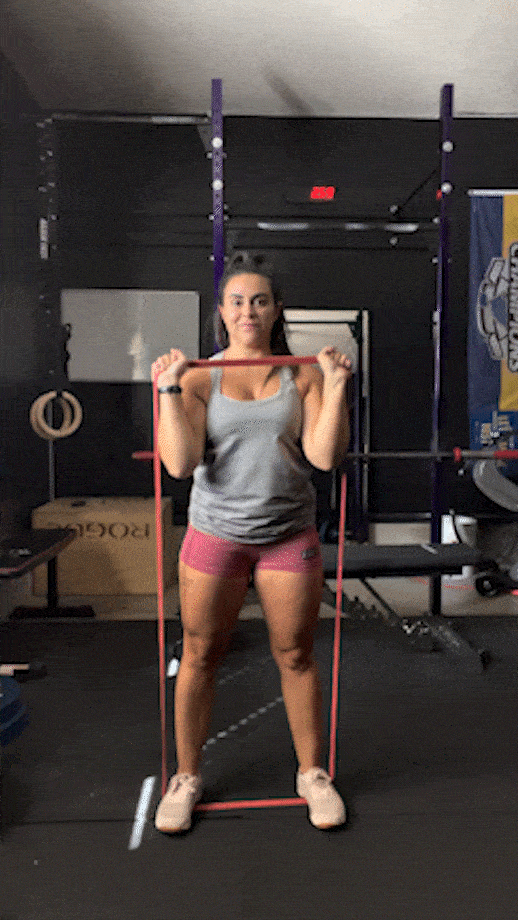
Resistance Band Lateral Raise
Muscles Targeted: Lateral deltoid
How to Do It:
- Place the band under the middle of both feet and hold the handles by your side with an overhand grip.
- Lift your hands to shoulder height, pause and slowly lower down.
- Repeat for desired reps.
Trainer Tip: Hold the band below the handles for extra resistance to progress the lateral band raise.
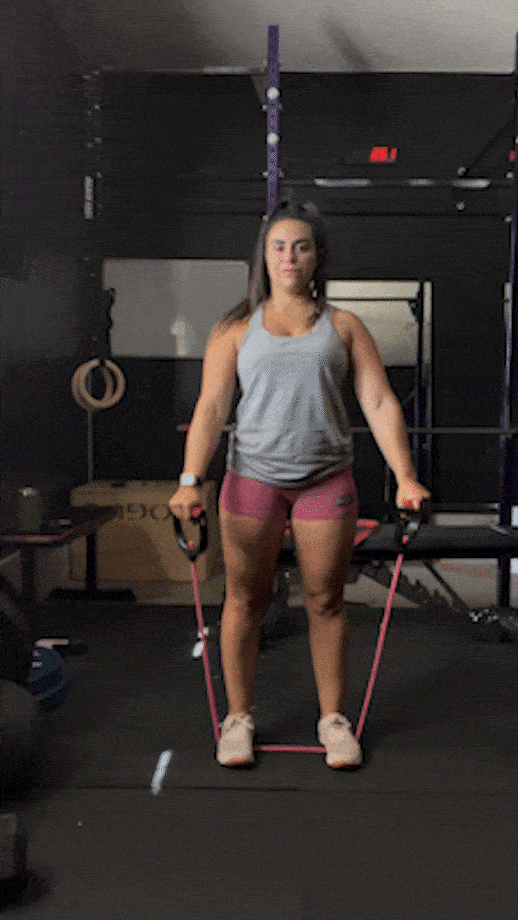
Resistance Band Pull Apart
Muscles Targeted: Posterior deltoid and upper back.
How to Do It:
- Grip the band with an over or under-hand grip around shoulder width apart and raise the band to shoulder height.
- Pull the band apart with a slight elbow bend by squeezing your shoulder blades together.
- Slowly return to the starting position when the band touches your upper chest.
Trainer Tip: Gripping your hands closer together on the exercise band makes this exercise harder, and gripping further apart makes it easier. Adjust for your desired intensity.
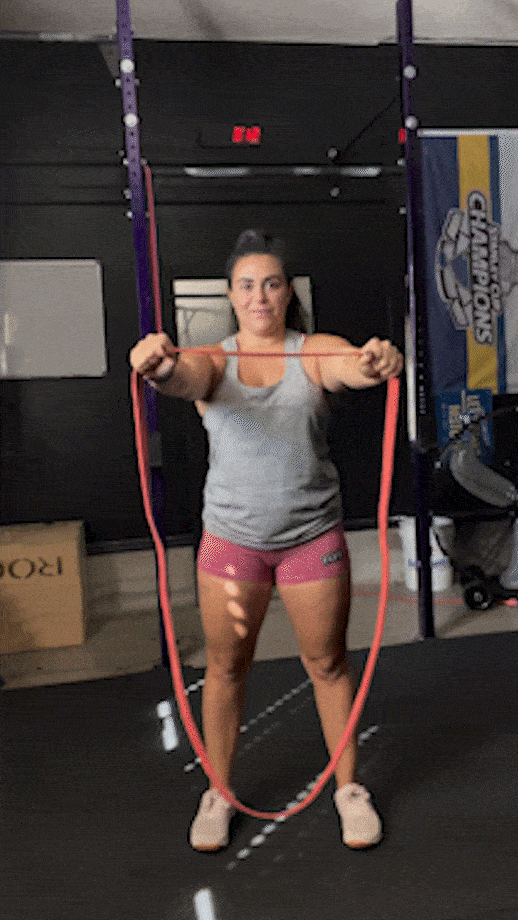
Upper-Body Resistance Band Workout: Q&A
Can you use resistance bands for the upper body?
Yes, and in fact, I would encourage it. Resistance bands give your joints a break from the stress of free weights, and you can train with higher volumes for added muscle-building and weight-loss potential.
Can you build muscle just using resistance bands?
Yes, you can build muscles with resistance bands, but there are better tools to build muscle. Bands only go high and stretch so far before breaking, so progression can be a problem. Strength training with free weights and machines is still the best muscle-building tool.
How do you work your whole upper body with a band?
You work your entire upper body with a band and any full-body workout by performing compound moves that train multiple muscle groups, like bent-over rows, chest presses, shoulder presses, and band pull-aparts.
Can you get big arms from resistance bands?
Arm workouts with resistance bands set the table for building bigger arms. Because band workouts are easier to recover from, you can train your arms more frequently for added muscle-building potential.
Further reading

A registered dietitian compares plant protein vs animal protein, helping you choose the most effective option for your needs! Read more

Looking for a treadmill walking workout to follow? We’ve got three options here written by a certified personal trainer. Read more

What can I say? I’m a simple man. When I see a new non-motorized treadmill come out, I want to test it. I previously tested and enjoyed the AssaultRunner Pro and was intrigued by the concept of the AssaultRunner Elite – the supposedly upgraded version.In this AssaultRunner Elite review, expect to see my honest opinion on the warranty, assembly, usage, and if I think it is worth the extra cash over the Pro. There are a lot of options on the market and it can be overwhelming knowing what to choose. I aim to make the buying process easier by giving you honest feedback you can trust.Why You Should Trust Us I’ve tried an insane amount of home gym equipment including my fair share of non-motorized treadmills including theReactive Runner Manual Curved Treadmill,HiTrainer ATP+ Treadmill, theTrueForm Trainer, and theTrueForm Runner. I’m always looking for the best of the best in fitness equipment and want to share my extensive product knowledge with you. Read more

Our Optimum Nutrition 100% Whey Gold Standard Review covers the macros and flavors of this popular protein powder. Read more

